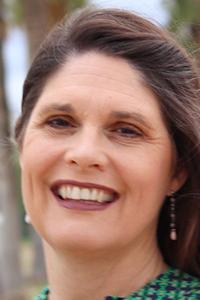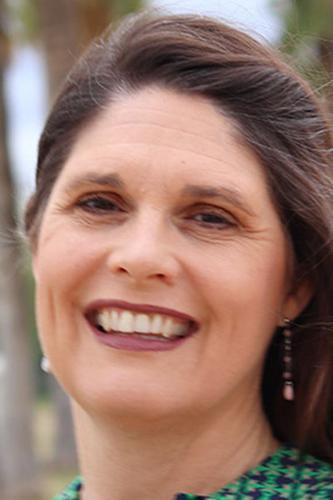The Tucson area’s legislative delegation is midway through a major turnover as six legislators resign partway through their terms.
Two of those seats have already been filled: Legislative District 11’s Rep. Bret Roberts is being replaced by Teresa Martinez, and LD 10’s Sen. Kirsten Engel by Stephanie Stahl Hamilton. But four seats are still in flux with less than two months to go before the next legislative session opens.
In Legislative District 10, which covers much of central and eastern Tucson, the district’s Democrats have selected three candidates from which the Pima County Board of Supervisors will choose a replacement. They are Morgan Abraham, Tom Chabin and Mitzi Cowell.

Stephanie Stahl Hamilton
The supervisors have not yet set a date for choosing a replacement, but it will likely be in early December.
In Legislative District 14, Rep. Becky Nutt resigned, leaving an opening to be filled by Republicans. That district covers the far southeastern part of the Tucson area, as well as Cochise, Graham and Greenlee counties.
The LD 14 Republicans chose as candidates Lupe Diaz, Brian McKeighen and Robert Montgomery. The Cochise County Board of Supervisors is scheduled to pick one of the three as Nutt’s replacement at a 1:30 p.m. meeting in Bisbee on Friday, Nov. 19.
Democratic state Reps. Dr. Randy Friese and Charlene Fernandez have also resigned.
Fernandez stepped down from her position representing Legislative District 4 to take a job as the U.S. Department of Agriculture’s Arizona director for rural development.
Friese, a trauma surgeon who represented Legislative District 9, said he’s resigning to focus on his medical career.
The LD9 Democrats are meeting Saturday to pick three names for possible replacements before the Pima County Board of Supervisors make a final selection.
To select Fernandez’s replacement, the elected precinct committeepersons of the Yuma County portion of LD4 were meeting Thursday night to select three names. The Yuma County Board of Supervisors will ultimately choose the replacement, but it’s unclear when that will happen, according to Xanthe Bullard, chair of the Yuma County Democratic Party.
An additional five legislators from other parts of the state have left office since the session ended, some of them to run for other offices, and others to take new jobs.
Tim Steller and Nicole Ludden
Brnovich launches YouTube channelThe Arizona Attorney General’s Office announced Thursday that t is starting a new YouTube channel called AGTV.

Attorney General Mark Brnovich has started a youtube channel.
Attorney General Mark Brnovich has hired Phoenix television news personality Heather Moore to run the channel, which will focus on consumer protection and other attorney general’s office activities.
Brnovich is in the midst of a tough, four-way competition for the GOP nomination for U.S. Senate. Kris Mayes, who is running for the Democratic nomination for attorney general, accused Brnovich of using taxpayer money to boost his image for campaign purposes.
“After seven years as attorney general, Mark Brnovich has decided that he needs his own TV channel to promote himself, and he thinks he can make the taxpayers pay for it,” Mayes said in a prepared statement.
She requested that the Arizona auditor general investigate Brnovich’s spending on the new video channel.
Grijalva attends climate meeting
U.S. Rep. Raúl Grijalva, the Tucson Democrat, attended the U.N. climate change conference in Glasgow, Scotland, as part of the congressional delegation led by House Speaker Nancy Pelosi.
Back on American shores, Grijalva explained, “Generally it was to show that the United States of America was reengaging in the climate fight. Part of setting an example is what you do domestically as well.”
While there, he called on the United Nations to increase Indigenous participation in the conference and combating climate change. His district includes the Tohono O’odham and Pascua Yaqui reservations.
Romero in D.C.
Mayor Regina Romero was at the White House on Monday for the signing of the Bipartisan Infrastructure Plan, a $1 trillion federal bill that will fund local initiatives like transportation projects and water security efforts.

Mayor Regina Romero was at the White House on Monday for the signing of the Bipartisan Infrastructure Plan
Romero was invited by President Joe Biden along with a number of other Arizona officials including U.S. Rep. Greg Stanton, Mesa Mayor John Giles and Navajo Nation President Jonathan Nez.
“This bill represents a historic investment in our nation’s infrastructure, supporting a number of potential projects locally, ranging from a state-of-the-art Bus Rapid Transit system and a new Tucson-Phoenix passenger rail line, to building a grid of electric-vehicle charging stations and cleaning up (water) contamination,” Romero said in a news release.
The state will receive $72 million to remove a toxic chemical called PFAS from the state’s drinking water. The use of the PFAS at local military bases has contaminated Tucson’s groundwater at levels that are hundreds of times higher than what the EPA allows.
Earlier this year, Tucson City Councilman Steve Kozachik called PFAS an “existential problem for this region” and said the city would have to come out of pocket to pay for cleanup efforts if the federal government didn’t provide funding.
Sam Kmack</&h6>






